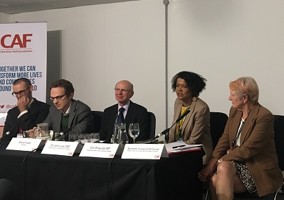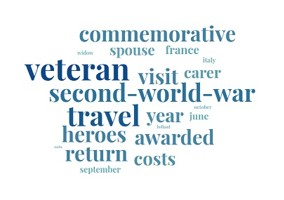Just as individuals can reflect upon their own data to make improvements, so too should charities. But how is this done? Like many things in life, evaluation of a charity’s impact on people’s wellbeing is essentially a three-step process…
Step one for a charity is to be clear about what you are trying to achieve. Can your impact be measured and related to real improvements in people’s lives? Then we need to think about how the specific actions of a charity influence the desired outcomes, using a model which relates inputs to outputs and outcomes.
Economists love building models, but models need to be based on realistic assumptions about the people we are trying to influence and the way they make decisions. Before the advent recent decades of behavioural economics, economic models were too often based on simplistic, naive assumptions: they worked in a world full of robots, but failed to grasp the realities of human behaviour.
Modern economists have a much more nuanced view of how people perceive value and trade-offs. And data, complemented by expertise and empathy, is the key to making those difficult choices.
Understand the difference
The next step is to understand what difference the charity has made. This is done by comparing the actual improvements experienced by people supported by the charity to what would have happened otherwise – this is what economists call "the counterfactual".
The database of the Office of National Statistics is invaluable here. It lists the levels of wellbeing in different geographies and provides quite detailed data which can be matched up with other data sets to yield some interesting insights.
As you define your analysis, you also need a clear picture of the outcomes that would be expected from the work done by a charity. Of course, when dealing with data of this kind, it is extremely important to understand requirements for privacy and anonymity.
Then we need measures to assess the improvement in people’s lives after the intervention. This is complicated, since wellbeing can be influenced by so many factors, so definition of terms and measures is crucial.
The final step is to consider whether any changes have proved durable, which ideally means going back to the beneficiaries to see if early improvements in wellbeing have been sustained over the long term.
Surmounting obstacles
So in working through these steps, what challenges and opportunities do charities face?
When it comes to quantitative analysis of charities’ work – especially when charity work is commissioned by the government – the focus tends to remain on how much money we are saving the taxpayer.
As we find convincing evidence of the long-term value of wellbeing, we can go much further and put a value on the positive difference we make to people’s lives, now and in the future.
When considering this, we should remember that there’s an important distinction between the fiscal impact of a charitable intervention and its broader social impact.
At Pro Bono Economics we always try to gauge the social impact multiplier, which is a much better approximation of wellbeing, but of course that comes at a greater (data and analytical) cost.
A good example of this is the project we conducted for City Year. Pro Bono Economics’ study of the value of volunteering found that encouraging 10,000 young people to volunteer full-time for a year could earn the UK economy from £28m to £119m, or a return from £1.20 to £1.60 on every Government pound invested.
Big business may be good making a fiscal impact, but when it comes to making a broader social impact, this is where third sector practices jump ahead of private sector practices. Are you listening, Google/Facebook/Amazon/Uber?
What’s in it for the charity?
As a chair of trustees, I can imagine that many of you are wondering about how burdensome all these different considerations can be. Small to mid-sized charities struggle most using data to understand impact.
These charities make up 97 per cent of the sector by volume and account for 19 per cent of the sector’s £45bn income and they have a unique working knowledge of issues which present at the front line.
That insight and expertise in delivering results deserves to be shared. Yet these smaller charities often find it hardest to produce and interpret data that proves, in black and white, their value to society.
What exactly, you might ask, does a charity gain by putting effort into producing evidence?
First and foremost: as charities, we need to use data to prove that we are making the world a better place.
As W. Edwards Deming, the influential American statistician said: "Without data, you're just another person with an opinion." Informed use of data, online and offline, is already essential in business and the public sector.
Even basic data, complemented by relevant case studies and linked to broader evidence, will serve the charity as a management tool in its operations and strategic development.
Second: we are going to need data to do business. As central and local government continues to devolve service delivery to charities, hard data will be needed to demonstrate the impact of their services and so support their case for funding.
Third and most important: once that data is contextualised and its wider social implications are assessed, it can help meet society’s most pressing challenges.
Charity data, so often lying dormant, may well contain real insights into the most vulnerable groups in our society – and the practical ways of improving their lives. It is our civic duty to collect it.
What charities need to do
As charities, we need to see data not as a daunting challenge, but as one of our most valuable assets. It is up to us to ensure that everyone from the chair of the board to the front-line support worker understands and uses data in their daily work. Data is not just for the boffins, it’s for all of us.
We need to share: For the sake of survival and growth, it is time for charities – both large and small – to join the data revolution. Larger, better-resourced charities are already leading the charge, but they need to get into the habit of sharing data-driven findings and insights with smaller charities that operate in the same space, and with community groups, local authorities and commissioners – and maybe with the public too.
All those stakeholders share a responsibility for making this country a better place, and a shared understanding of crucial data will put us all at an advantage. At Pro Bono Economics we are committed to open source – in other words we make our reports and their conclusions public. We would like to see everyone contributing to an open data initiative for the charity sector.
Policy needs to support good practice. Could the Charity Commission and the other sector bodies provide more practical support here in harnessing data?
The new Charity Governance Code is a start, in that it recognises both the importance of accountability for impact and the key elements which support it. But here is the catch, the code is voluntary, the expectations are set at the same level for large and small charities, and they are aspirational.
Lord Gus O'Donnell is chair of Pro Bono Economics he will be delivering the opening keynote at the Charity Finance Summit this morning.#CharityFinanceWeek
Related articles












